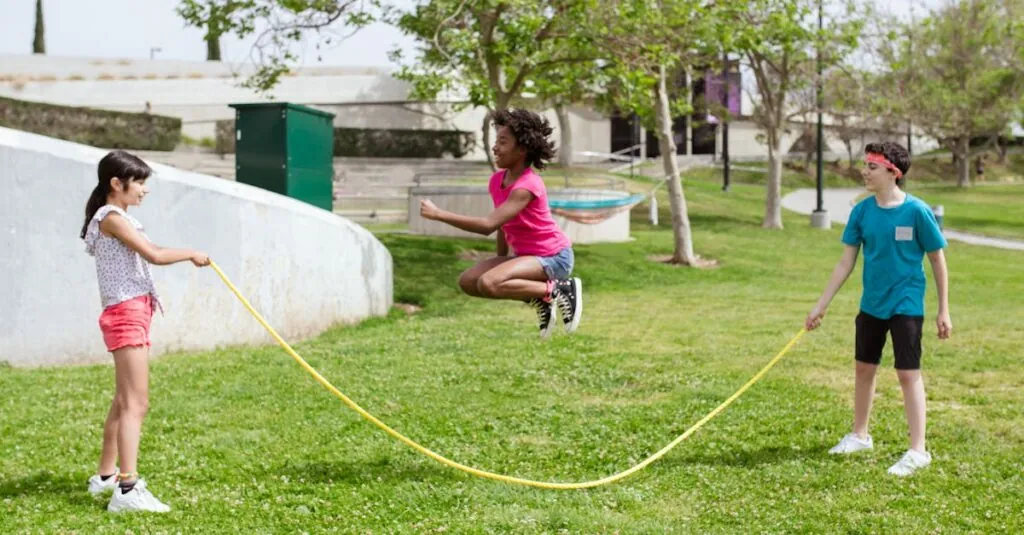Table of Contents
ToggleImagine a world where kids trade their video game controllers for beakers and circuit boards. Enter the realm of STEM camps, where science, technology, engineering, and math come alive in ways that make learning feel like a thrilling adventure. These camps turn curious minds into budding inventors, all while ensuring they have a blast. Who knew building a robot could be more fun than a game of tag?
Overview of STEM Camps for Kids
STEM camps for kids provide hands-on learning experiences in science, technology, engineering, and math. These camps focus on engagement and creativity, allowing children to explore complex concepts through practical activities. Participants frequently engage in building projects, programming robots, or conducting experiments that foster critical thinking.
In summer and holiday sessions, many organizations offer specialized STEM camps that cater to different age groups and skill levels. These camps target various interests, so kids can choose topics like robotics, coding, environmental science, or aerospace. The diversity in options helps maintain high levels of excitement and motivation among attendees.
Staffed by experienced educators and industry professionals, camps often encourage teamwork and collaboration. This approach enhances social skills while enabling kids to work together on projects. Events may include competitions or showcases where participants demonstrate their projects to families and peers, creating a supportive community.
Feedback from parents and educators consistently highlights positive outcomes. Campers often exhibit increased enthusiasm for STEM subjects after participating. Increased confidence in problem-solving and a greater understanding of technology frequently result from the immersive nature of these camps. Studies show that early exposure to STEM fields enhances future academic and career opportunities.
Overall, STEM camps equip kids not only with knowledge but also with the skills necessary for future success. Emphasis on creativity, teamwork, and real-world application enables participants to cultivate a lifelong passion for exploration in science and technology.
Benefits of STEM Education
STEM education offers significant advantages for children. Engaging in these programs cultivates essential skills that support their academic and personal growth.
Enhancing Critical Thinking Skills
Critical thinking develops as kids tackle real-world problems in STEM camps. Participants learn to analyze information, evaluate outcomes, and make informed decisions. Engaging in projects encourages them to question assumptions and explore various solutions. For instance, while building a robot, they identify issues and implement strategies to overcome obstacles. This hands-on approach to learning fosters an investigative mindset. Children often leave the camp equipped to address challenges creatively, making them resourceful thinkers.
Fostering Creativity and Innovation
Creativity flourishes in the vibrant environment of STEM camps. Kids have opportunities to express ideas in unique ways, from designing coding programs to constructing engineering projects. Facilitators encourage out-of-the-box thinking by allowing children to experiment without the fear of failure. Participants often collaborate on innovative inventions, fueling inspiration and teamwork. For example, group projects in robotics challenge them to create original solutions, sparking imaginative thinking. This supportive atmosphere nurtures innovation, laying a foundation for future endeavors in STEM fields.
Types of STEM Camps
STEM camps come in various forms, catering to different interests. Each type allows children to engage with key concepts through interactive and practical experiences.
Robotics Camps
Robotics camps immerse children in the design and programming of robots. Participants learn to build and code robots, enhancing their understanding of mechanics and technology. Activities often include competitions, which foster teamwork and encourage friendly rivalry. Young inventors assemble robots using components like sensors and motors, honing problem-solving skills in the process. Exposure to programming languages, such as Python or Java, empowers campers to direct robot behavior and improve logical thinking.
Coding and Programming Camps
In coding and programming camps, kids develop essential skills in computer science. These camps introduce various programming languages, allowing children to create games and applications. Activities often include group projects where attendees collaborate to solve coding challenges. Understanding algorithms plays a pivotal role in enhancing critical thinking and creativity. Popular platforms like Scratch and Codecademy provide accessible entry points for all skill levels, ensuring everyone feels comfortable while diving into this exciting field.
Science and Environmental Camps
Science and environmental camps focus on real-world challenges, inspiring children to explore biodiversity and sustainability. Campers engage in hands-on experiments and outdoor activities. Topics often include ecology, marine biology, and climate change, which spark a sense of stewardship for the planet. Young scientists conduct experiments to analyze data and draw conclusions, enhancing their inquiry skills. Field trips to nature reserves or scientific institutions often supplement the learning experience, solidifying concepts and encouraging a lifelong interest in environmental science.
What to Expect at STEM Camps
STEM camps engage children in exciting, hands-on learning experiences. They immerse kids in interactive projects and activities designed to inspire creativity and problem-solving.
Daily Activities and Curriculum
Daily activities incorporate various subjects within STEM. Kids might build robots, engage in coding challenges, and conduct scientific experiments. Classes often blend outdoor exploration with classroom sessions, making learning dynamic. Projects encourage teamwork, fostering collaboration among participants. Curriculum varies by camp but consistently promotes critical thinking and innovation. Engaging workshops and guest speakers enhance learning, introducing children to potential career paths in STEM fields.
Age Groups and Levels
STEM camps cater to a wide age range, typically from 6 to 18 years old. Programs target specific age groups, ensuring appropriate content and activities. Younger children focus on foundational skills, while older participants tackle advanced concepts. Beginner camps help novices gain confidence, whereas advanced camps challenge experienced kids with intricate projects. This diversity allows children to learn at their own pace, adapting to different interests and skill levels. Each program emphasizes growth and exploration, encouraging all participants to develop a lifelong passion for STEM.
Choosing the Right STEM Camp
Selecting the proper STEM camp can enhance a child’s learning experience. Parents should evaluate several factors to ensure a good fit.
Factors to Consider
Age appropriateness plays a significant role in camp selection. Camps typically cater to children aged six to eighteen with tailored programs for different age groups. Curriculum focus is equally essential; some camps emphasize robotics while others target coding or environmental science. Class size matters too, as smaller groups foster personalized attention and collaborative learning experiences. Location influences convenience; local camps reduce travel time, making it easier for families. Safety protocols are vital as well, especially in hands-on activities. Lastly, consider the camp’s reputation; reviews from parents and former campers can provide insight into the experience.
Recommendations for Parents
Researching online can reveal various options, enabling informed decisions. Visiting camp websites helps parents understand available programs and educators’ backgrounds. Asking about safety measures ensures children feel secure during activities. Noting specific goals is crucial; families should identify what skills they want their children to gain from the experience. Exploring sibling discounts or financial aid options may ease budget constraints. Additionally, attending open houses allows parents and kids to interact with counselors and future peers, enhancing comfort levels. Ultimately, focusing on communication with camp leaders can clarify expectations, ensuring a fulfilling experience.
STEM camps offer an invaluable opportunity for kids to dive into the exciting worlds of science, technology, engineering, and math. By engaging in hands-on activities and collaborative projects, children not only enhance their critical thinking skills but also ignite a passion for learning that can last a lifetime.
With various camp options available, parents can find programs that align with their child’s interests and age group. The supportive environment fosters creativity and teamwork, preparing kids for future challenges in STEM fields. Investing in a STEM camp experience can be a pivotal step in nurturing the next generation of innovators and problem solvers.








